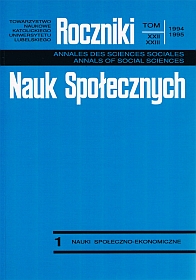Państwo jako społeczność naturalna według św. Tomasza z Akwinu
Abstrakt
St. Thomas was certainly under the influence of Aristotle when he adopted the view that the State is a natural community, i.e. grounded in social human nature. It does not result from a social contract or class divisions of society, but is anchored in people as substantial subjects of social life. In view of this it has always existed in both an embryonic and developed form. And what is more, it will last as long as people will last.
The author presented Thomas’s thesis about the natural character of the State in the following way: he first showed the genesis of the State based on an analysis of human nature; then he pointed out what the essence of the State and its basic functions consist in; eventually, he evaluated the opinions of St. Thomas against the background of the medieval theories of the State. The most important statement being that it is the aim, that is common good of all citizens, that decides about the essence of the State. The content of this good defines the basic functions of the State to which belong the following: ensuring material needs, care about good and virtuous life, and preserving internal order and external security.
The thesis of the natural character of the State does not fall under any questioning, and yet some opinions over the centuries have undergone changes. We mean especially economical independence and religious character of the State. Even if the latter is developed to the utmost degree, it is and cannot be autarkic. The more so it cannot serve some supernatural aims, because this belongs to the tasks of religious community. The State’s activity must be reduced to the present day.
Having thus corrected Thomas’s opinions, the thesis of the natural character of the State is fully justified. No wonder that it has been approved in the social teaching of the Church initiated by Leo XIII.
Copyright (c) 1995 Roczniki Nauk Społecznych

Utwór dostępny jest na licencji Creative Commons Uznanie autorstwa – Użycie niekomercyjne – Bez utworów zależnych 4.0 Międzynarodowe.


